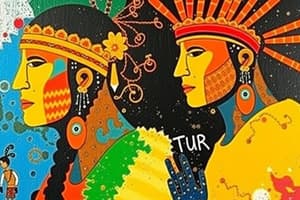Podcast
Questions and Answers
What role do institutions play in relation to individuals within society?
What role do institutions play in relation to individuals within society?
- They create a uniform way of life for all individuals.
- They have no effect on individuals.
- They solely dictate how individuals should function.
- They influence how individuals think and act. (correct)
What is the primary belief of the Nacirema regarding the human body?
What is the primary belief of the Nacirema regarding the human body?
- It can be changed through positive thinking alone.
- It is a source of beauty and strength.
- It is inherently strong and healthy.
- It tends to be ugly and prone to disease. (correct)
What do households of the Nacirema typically have to address their beliefs about the body?
What do households of the Nacirema typically have to address their beliefs about the body?
- One or more shrines for rituals and ceremonies. (correct)
- Only one central shrine for the entire community.
- Common areas for communal rituals.
- No special facilities for addressing these beliefs.
What is kept in the focal point of the shrine in Nacirema households?
What is kept in the focal point of the shrine in Nacirema households?
Who are considered the most powerful individuals in Nacirema society?
Who are considered the most powerful individuals in Nacirema society?
What type of language do medicine men use when writing down the ingredients for potions?
What type of language do medicine men use when writing down the ingredients for potions?
What architectural elements do poorer Nacirema families imitate from the wealthier class?
What architectural elements do poorer Nacirema families imitate from the wealthier class?
What is one of the principal aims of sociological research as identified in this context?
What is one of the principal aims of sociological research as identified in this context?
Which historical event is emphasized as foundational to sociological thought?
Which historical event is emphasized as foundational to sociological thought?
How did modern democracy contribute to sociological thought?
How did modern democracy contribute to sociological thought?
What was one outcome of Durkheim’s study of suicide?
What was one outcome of Durkheim’s study of suicide?
What does the term 'Demos' refer to in the context of modern democracy?
What does the term 'Demos' refer to in the context of modern democracy?
Which social values were advanced during the Scientific Revolution?
Which social values were advanced during the Scientific Revolution?
What shift in the perception of social issues occurred with the rise of modern democracy?
What shift in the perception of social issues occurred with the rise of modern democracy?
What method of understanding society is emphasized within sociological research?
What method of understanding society is emphasized within sociological research?
What is the primary concern of the Nacirema regarding the mouth?
What is the primary concern of the Nacirema regarding the mouth?
In the hierarchy of magical practitioners among the Nacirema, who holds the highest prestige?
In the hierarchy of magical practitioners among the Nacirema, who holds the highest prestige?
Émile Durkheim's main focus in sociology was on which of the following?
Émile Durkheim's main focus in sociology was on which of the following?
According to Durkheim, how do societal conditions influence individual decisions?
According to Durkheim, how do societal conditions influence individual decisions?
What unique aspect differentiates sociology from philosophy according to Durkheim?
What unique aspect differentiates sociology from philosophy according to Durkheim?
In what way did Durkheim study suicide rates?
In what way did Durkheim study suicide rates?
What significant change did industrialization bring about in urban life?
What significant change did industrialization bring about in urban life?
What was one of the initial focuses of sociological studies?
What was one of the initial focuses of sociological studies?
According to Peter Berger, what does sociology strive to achieve?
According to Peter Berger, what does sociology strive to achieve?
What is the purpose of questioning the familiar in sociology?
What is the purpose of questioning the familiar in sociology?
What does the concept of "seeing the general in the particular" entail?
What does the concept of "seeing the general in the particular" entail?
What typically governs social life prior to the 19th Century?
What typically governs social life prior to the 19th Century?
Which of the following is not considered a core aim of sociology?
Which of the following is not considered a core aim of sociology?
What is the relationship between independent and dependent variables?
What is the relationship between independent and dependent variables?
Which of the following is NOT a qualitative research method?
Which of the following is NOT a qualitative research method?
What is the primary purpose of conducting experiments in sociological research?
What is the primary purpose of conducting experiments in sociological research?
Which research method allows sociologists to actively participate and engage with a group?
Which research method allows sociologists to actively participate and engage with a group?
What kind of research primarily focuses on characteristics, attitudes, or behaviors?
What kind of research primarily focuses on characteristics, attitudes, or behaviors?
Focus groups are best described as which of the following?
Focus groups are best described as which of the following?
Which statement accurately describes quantitative research?
Which statement accurately describes quantitative research?
What is the significance of research questions in sociological studies?
What is the significance of research questions in sociological studies?
What are the four main types of research methods sociologists use?
What are the four main types of research methods sociologists use?
What is the main purpose of Garfinkel's breaching experiments?
What is the main purpose of Garfinkel's breaching experiments?
How does studying crime through interviews benefit sociologists?
How does studying crime through interviews benefit sociologists?
Which of the following is NOT a core area of study in sociology?
Which of the following is NOT a core area of study in sociology?
When social norms are breached, what aspect of human interactions is revealed?
When social norms are breached, what aspect of human interactions is revealed?
What does the study of sociology aim to achieve regarding everyday life?
What does the study of sociology aim to achieve regarding everyday life?
In what way might participant observation assist sociologists studying crime?
In what way might participant observation assist sociologists studying crime?
What is the role of expectations in everyday social interactions?
What is the role of expectations in everyday social interactions?
Flashcards
Sociological Research Aims
Sociological Research Aims
The main goals of sociology, including defining everyday life themes, questioning the familiar, and examining societal influences on individuals.
Durkheim's Study of Suicide
Durkheim's Study of Suicide
A groundbreaking sociological study that explores how social structures influence individual actions like suicide.
Modern Democracy
Modern Democracy
A system of government where authority resides within the society itself, emphasizing people's role in societal change.
Social Issues
Social Issues
Signup and view all the flashcards
Scientific Revolution
Scientific Revolution
Signup and view all the flashcards
Empiricism
Empiricism
Signup and view all the flashcards
Sociology and Democracy
Sociology and Democracy
Signup and view all the flashcards
Themes of Everyday Life
Themes of Everyday Life
Signup and view all the flashcards
Urbanization
Urbanization
Signup and view all the flashcards
Social Relations
Social Relations
Signup and view all the flashcards
Sociology
Sociology
Signup and view all the flashcards
Seeing the General in the Particular
Seeing the General in the Particular
Signup and view all the flashcards
Questioning the Familiar
Questioning the Familiar
Signup and view all the flashcards
Collective Behaviour
Collective Behaviour
Signup and view all the flashcards
Nacirema Rituals
Nacirema Rituals
Signup and view all the flashcards
Demographics Change
Demographics Change
Signup and view all the flashcards
Institutions
Institutions
Signup and view all the flashcards
Influence of Institutions
Influence of Institutions
Signup and view all the flashcards
Nacirema
Nacirema
Signup and view all the flashcards
Human Body Perception
Human Body Perception
Signup and view all the flashcards
Rituals and Ceremonies
Rituals and Ceremonies
Signup and view all the flashcards
Shrines
Shrines
Signup and view all the flashcards
Medicine Men
Medicine Men
Signup and view all the flashcards
Secret Language of Healing
Secret Language of Healing
Signup and view all the flashcards
Independent Variable
Independent Variable
Signup and view all the flashcards
Dependent Variable
Dependent Variable
Signup and view all the flashcards
Quantitative Research
Quantitative Research
Signup and view all the flashcards
Qualitative Research
Qualitative Research
Signup and view all the flashcards
Surveys
Surveys
Signup and view all the flashcards
Interviews
Interviews
Signup and view all the flashcards
Participant Observation
Participant Observation
Signup and view all the flashcards
Content Analysis
Content Analysis
Signup and view all the flashcards
Holy-mouth-men
Holy-mouth-men
Signup and view all the flashcards
Mouth-rite Ritual
Mouth-rite Ritual
Signup and view all the flashcards
Émile Durkheim
Émile Durkheim
Signup and view all the flashcards
Social Integration
Social Integration
Signup and view all the flashcards
Suicide Study
Suicide Study
Signup and view all the flashcards
Social Facts
Social Facts
Signup and view all the flashcards
Empirical Research
Empirical Research
Signup and view all the flashcards
Sociological Research Methods
Sociological Research Methods
Signup and view all the flashcards
Surveys in Sociology
Surveys in Sociology
Signup and view all the flashcards
Experiments in Sociology
Experiments in Sociology
Signup and view all the flashcards
Interviews in Sociology
Interviews in Sociology
Signup and view all the flashcards
Garfinkel's Breaching Experiments
Garfinkel's Breaching Experiments
Signup and view all the flashcards
Social Norms
Social Norms
Signup and view all the flashcards
Restoring Social Order
Restoring Social Order
Signup and view all the flashcards
Study Notes
Introduction to Sociology
- Sociology is the systematic study of human society.
- Core areas of study include social inequality, social institutions, and social change.
- Sociologists aim to uncover general themes in everyday life, critique the familiar, and understand how society shapes individuals and vice-versa.
- Several qualitative and quantitative methods are employed in sociological research.
Birth of a New Discipline
- Modern democracy, industrial revolution, and scientific revolutions all contributed to the formation of sociology.
- The modern era's social dynamics sharply contrast those of previous historical eras.
- The development of the sociological discipline mirrored these epochal changes.
Introduction: Understanding Society II
- The principal aims of sociological research include defining everyday life themes, questioning the familiar, and examining how individuals shape society as well as being shaped by it.
- Examples of pioneering sociological studies exist such as Durkheim's study of suicide (1897), which analyzed societal impacts on individual behavior.
Sociology and Democracy
- Modern democracy is essential to sociological thought.
- People shape and alter society; authority is found in societal structures, not external forces.
- Public issues, historically attributed to natural causes, now viewed as social issues, such as shifts from theocratic to democratic societies.
Scientific Revolution
- The Scientific Revolution (or Enlightenment) marked a turning point in thought.
- Key features included a reliance on reason and empiricism (observation and experience).
- Scientific thought advanced social values such as freedom, equality, and tolerance, challenging existing authorities.
Industrial Revolution and Urbanization
- Rapid urbanization accompanied industrialization.
- Social relations changed dramatically in urban environments, unlike the rural traditions of the past.
- Studies of poverty and other social issues arising from industrialization emerged as a new focus in sociology.
Three Core Aims of Sociology
- The three main goals of sociology are to define general themes in life, question the familiar, and examine how individuals shape and are shaped by society.
- This involves considering the general in the particular (Peter Berger, 1963)
1. Find the General Themes in Everyday Life
- Sociologists search for patterns in human behavior.
- This includes understanding why certain social patterns exist and how they become ingrained in daily life.
2. Questioning the Familiar
- Everyday social life is not always apparent.
- Familiarity can hinder deeper understanding of social functions.
- Critical sociological thinking requires examination of everyday assumptions.
- Examples include analyzing seemingly simple social conventions to understand their underlying social rules and norms.
Questioning the Familiar – Specific Example (Nacirema)
- Horace Miner's "Body Rituals Among the Nacirema" (1956) is a case study illustrating the need to question assumptions about social norms.
- This example showcases the anthropological perspective of discovering new social norms even within relatively familiar societies.
3. How We Shape Society vs. How it Shapes Us
- The formation of institutions exemplifies the active role of groups in shaping society and how the individuals who created those institutions are influenced by them.
Who are the Nacirema?
- The Nacirema are not a distinct group; this is an ethnographic example of how societal norms can be viewed with an anthropological perspective.
- Anthropologists aim to document behaviors in a non-judgmental manner.
The Nacirema Ritual System
- The Nacirema practice elaborate rituals centered around their belief that the human body is flawed.
- Rituals center around cleansing, curing illnesses, and achieving beauty.
Émile Durkheim and the Study of Suicide
- Durkheim's research demonstrated the influence of societal factors on individual behavior.
- Durkheim believed suicide is not an isolated action, but impacted by broader societal circumstances and variables.
- He noted that suicide rates vary based on societal factors like social integration and social regulation.
4 Types of Suicide
- Egoistic: low social integration.
- Altruistic: high social integration
- Anomic: low social regulation
- Fatalistic: high social regulation.
Egoistic Suicide
- Low social integration factors lead to higher suicide rates.
- This is correlated with individualism in religion (Protestantism) compared to more collectivist religions.
Altruistic Suicide
- High social integration factors lead to higher suicide rates.
- Occurring when individuals prioritize group needs above their own (e.g., suicide for the military or religious cults).
Anomic Suicide
- Low social regulation leads to higher rates of suicide.
- This occurs when the social norms and structures in society are weak.
Fatalistic Suicide
- High social regulation and lack of individual autonomy contribute to high rates of suicide.
- This is exemplified with slaves in historical periods and similar cases.
Research Methods: How Do Sociologists Study Society?
- Sociologists use various methods to study society.
Quantitative Methods
- Surveys: gathering data through questionnaires from large groups.
- Experiments: comparing groups to understand behavior and the factors that influence it.
Qualitative Methods
- Interviews: in-depth conversations to better grasp individual experiences and insights.
- Participant observation (ethnography): active involvement in a social group to learn about norms and social behavior over a significant period.
Additional Research Methods
- Content analysis: studying documents, texts, and similar media.
- Focus groups: discussions with larger groups, like interviews.
Doing Sociology
- Different sociological research methods are useful for answering specific types of research questions about a social behavior.
- Examples include using questionnaires to study crime, experiments to understand perception of criminals, interviews to examine complex thought patterns, and participant observation.
Harold Garfinkel - Breaching Experiments
- Harold Garfinkel's breaching experiments illuminate social norms.
- Social interactions are based on established norms and expectations.
- Breaking social rules forces participants to confront the inherent rules governing society and social interactions.
Summary
- Sociology systematically studies human society.
- Sociologists focus on social inequality, social institutions, and social change.
- They use various qualitative and quantitative research methods to understand social behavior patterns.
Studying That Suits You
Use AI to generate personalized quizzes and flashcards to suit your learning preferences.





